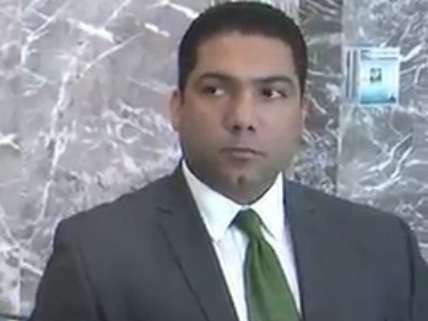The New York Times Knows Florida's Self-Defense Law Is Bad but Can't Figure Out Why
The dismissal of a manslaughter charge against a sheriff's deputy gives the paper another opportunity to misrepresent Florida's law.

Yesterday a Florida judge dismissed a manslaughter charge against Peter Peraza, a Broward County sheriff's deputy who in 2013 shot and killed Jermaine McBean, a black man carrying an air rifle. Peraza won the dismissal under a provision of Florida's self-defense law that allows a defendant to seek a pretrial hearing at which he can try to persuade a judge it is more likely than not that his use of deadly force was justified. That provision is unusual, and prosecutors argue that it should not apply to police officers. But as it typically does, The New York Times zeroes in on the wrong aspect of Florida's supposedly benighted law, which it says "makes it easier for people to claim self-defense if they have a reasonable belief that their lives are threatened, whether the threat proves real or not."
A similar standard applies throughout the country—even in New York, where the use of deadly force is legal if "the actor reasonably believes that [the] other person is using or about to use deadly physical force." In this case, Peraza and other deputies were responding to multiple 911 calls about a man walking down the street with a gun. Peraza testified that McBean ignored repeated commands to drop the "weapon" and instead pointed it at the cops. "I've never been so scared in my life," Peraza said, adding that he saw McBean as a threat not only to him and his colleagues but to "women and children in the pool area" of McBean's apartment complex, which he was approaching.
It turned out that McBean, who had just bought the camouflage-colored air rifle at a pawnshop and was heading home with it, was listening to music through earbuds that may have prevented him from hearing the cops' commands. But Peraza said he did not know any of that at the time and took the action he thought was necessary to protect himself, his colleagues, and the bystanders. Legally, that belief could have been reasonable even though it was based on a threat that proved illusory, as the judge apparently concluded. But Peraza could have mounted the same defense in New York or any other state.
The difference is that in New York he would not have had that opportunity until he went to trial. In Florida, by contrast, someone who uses deadly force in self-defense has "immunity from criminal prosecution," which the Florida Supreme Court has interpreted to require the option of a pretrial hearing like the one Peraza had. Florida legislators added that provision in 2005 as part of the same law that eliminated the duty to retreat for people attacked in public places. But the latter provision was not relevant to Peraza's defense (just as it was not relevant to George Zimmerman's defense) because by his account he did not have the option of retreating. Times reporter Niraj Chokshi is therefore misleading his readers when he says Peraza "invoked the state's so-called Stand Your Ground law as a defense." What actually happened is that he invoked a standard defense, a defense he could have used in a state without a "stand your ground" law, but did so in an unusual setting—a pretrial hearing instead of a trial.
The rationale for such hearings is that someone who claims he used deadly force in self-defense should not have to go through the rigors of a full trial unless the prosecution has a strong case—stronger than the usual minimum requirement of probable cause. If the defendant prevails by a "preponderance of the evidence" standard at the pretrial hearing, it is hard to see how the prosecution could have proven him guilty beyond a reasonable doubt in a trial. Assuming that the jurors' understanding of the law and view of the evidence would have been similar to the judge's (which may or may not be a reasonable assumption), this option should not change the outcome—just the amount of time, effort, stress, and money required to arrive at that outcome.
But the Times is in no position to report on or pontificate about the controversy over the legal provision that Peraza used because it does not seem to understand which provision that was, and its confusion about Florida's law is not limited to one reporter. In a 2012 story about Zimmerman's shooting of Trayvon Martin, reporters Lizette Alvarez and John Schwartz said that "under Florida's lenient self-defense law…any person who perceives a threat to his life is not required to attempt a retreat and has a right to use a weapon." That description is incorrect, since the law requires a reasonable belief; a mere perception will not do. Mentioning the duty to retreat in this context is also misleading, since the absence of such a duty played no role in Zimmerman's defense, as Times reporter Cara Buckley conceded a few months later, even while insisting that the case was "spotlighting Florida's Stand Your Ground law."
In a 2013 editorial about Zimmerman's acquittal, the Times incorrectly asserted that Florida's self-defense law is unusual because "a person may use deadly force if he or she 'reasonably believes' it is necessary to prevent death or great bodily harm—a low bar that the prosecutors in this case fought in vain to overcome." That "low bar" is no higher in New York or any other state. In 2014 Alvarez claimed "the 2005 law makes it easier for people to claim self-defense if they have a reasonable belief that their lives are threatened, whether the threat proves real or not"—the highly misleading gloss echoed by Chokshi in his story about the Peraza case.
The Times knows "Florida's contentious self-defense law" is bad. It just can't figure out why.
[This post originally misidentified Chokshi as a woman. Sorry about that.]


Show Comments (40)